WHAT YOU NEED TO KNOW ABOUT WEB HOSTING
Who Is The Cheapest For Web Hosting?
Hosting Reviews
10 Things You Should Know Before Choosing A Web Host
Introduction
Choosing a web host is as important as the content you will put on the site itself. The success of your site will, to a large extent, depend on the versatility of your web host. In this guide, we take a look at services provided by web hosting companies and the features website owners should consider when making a choice.
A web host is a company that provides space to keep your files so they can be viewed across the internet. Most companies charge a fee for such services, and the amount charged will vary from company to company. It would be mostly dependent on the kind of services you are seeking from the firm and the length of time.
Information about your website is kept on computers called servers. These servers are high speed machines that are capable of delivering web pages to your site visitors faster than ordinary home PCs can.
The web host will price its services accordingly to the length of time the service is been offered to the website owner. Periods are usually calculated on a monthly basis, though a few charge annual fees. Each fee will correspond to a set of features as requested by the client.
The price of each item will depend on the level of sophiscation of the service. For example, if you wanted a security or e-commerce service, your price will be higher than someone who just wanted a place to keep files. Running a website requires shopping cart activities will is more costly than ordinary web space.
You do not own the equipment from which the hosting service is delivered to you, you only rent the space. When you quit the service, the same space will be allocated to another buyer.
The prices, features and characteristics of the web host are usually all displayed at their website. On many occasions you will find a table that spells out the various services, differences, similarities and points that help the customer make a choice.
So, given the jobs that web hosts do, how do we choose one that will best meet our needs? There is no simple answer to this question. Our choice will depend on so many things, including the kind of site we are hosting, our budget and the technology used to create the site. Notwithstanding these peculiarities, web hosts must be able to provide bottom-line services irrespective of your individual needs. The next topics take a look at the issues we must take note of when selecting a web host for our website.
Bandwidth Allotment
Bandwidth is the amount of traffic allocated to a website. It is also called data transfer. As users visit and leave your website, they create traffic. This traffic represents wear and tear on the web host equipment so they charge website users accordingly. The more traffic you have for your website, the more bandwidth you will need. Sites that offer heavy applications such as chat, forum, software download and video uploads and download would have to get very high bandwidth.
As you may see from Figure 1, higher bandwidth makes a site more versatile and therefore costs more.
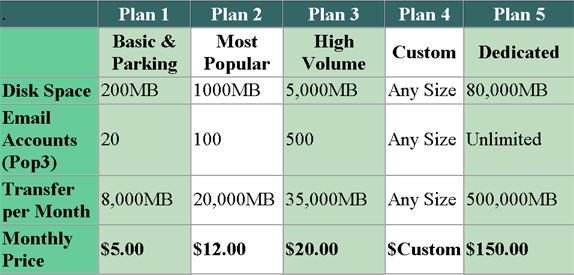
* Figure 1. A web host chart showing bandwidth prices
You web host must be able to provide you with a high bandwidth if you are going to incur very heavy traffic at your website. You will not want to visit your site one day to see a Bandwidth Exceeded notice.
To calculate your bandwidth, you will have to make a projection of what services you will offer and how many people would visit your site in a day or month. If you forecast 100,000 visitors a month and each visitor browses 10 pages of about 60K size, then your bandwidth needed would be 100,000X10X60K=60,000,000 or 60GB.
So by this simple calculation, you realize that you need a bandwidth of 60GB.
The web host you choose must therefore offer you this amount of data traffic. If you have a simple website with only text and graphics, then 40GB would be just enough.
As you look for hosts, be careful not to be confused about the Unlimited
Bandwidth offer used on many web host sites. This offer is different from
actual bought bandwidth. The unlimited bandwidth offer is mostly used for
small, shared hosting websites and it is usually unpaid for. The assumption
is that small sites do not consume much bandwidth and would never exceed 40
GB bandwidth or thereabout, no matter what traffic they experience. If you
anticipate heavy traffic, buy the required bandwidth as the unlimited
bandwidth offer is not guaranteed.
If you have a small site but anticipate future growth, you should go for a
hosting plan that allows you to upgrade to a higher bandwidth service.
Bandwidth is very important in website management. It is essential that you buy the right amount to keep your site running at all times.
Server-Side Functionality
Server side functionality refers to the ability of servers to execute programs that output onto web pages. They are scripts that reside on web servers and allow you to run interactive websites. For example, if you had a database of user names and passwords of all your website users, the program that offers the login authentication will be based on your server and not located on the website page. Almost every complex site such as membership and e-commerce ones will necessarily require server side functionality.
If you are offering such a site or any one that requires that such a program be run, you will need a web host which offers server side functionality. The server side functionality reduces the burden of web pages in most cases and enables sites to provide dynamic information to their users. It also reduces the size of web pages and resultantly makes sites load faster.
Many common Internet functionalities such as email and password management, polls, photo rating services, mailing lists, require server side functionality.
Your web host must provide the common functionalities used by almost every web page on the internet. At the minimum, your host must offer you a CGI-BIN. This important server side script allows you to run interactive scripts such as guestbook and contact forms.
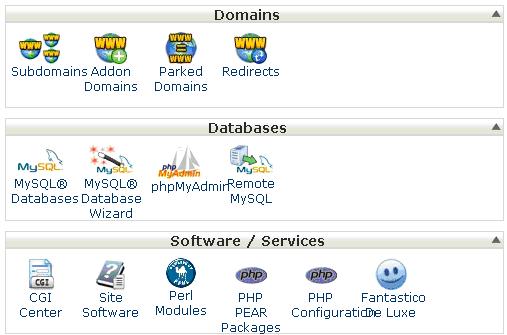
* Figure 2. Server side functionality as shown in cPanel
Figure 2 shows part of a website management tool that controls the server side functionality of a web server.
Another server side functionality will be the ability of your site to run ASP (Active Server Pages). This technology from Microsoft enables you to display dynamic pages. For example if you had a website that displayed search results according to the criteria specified by the user, then you will need the ASP functionality. Moreso, if your site was predominantly created with MS FrontPage, you will obviously need ASP. If you have a file in your website with the extension .asp, then you need a host with ASP capabilities.
PHP is another widely used script. PHP also generates dynamic content but its usage spans almost every known activity on the net. From membership sites to user authentication to online forms, PHP has been used in all of these. If you have files with .php extensions, you must have a host that provides this script via their server. MySQL is an easy to use database that runs on servers. You will need this script to manage any type of database you have especially if you are not using a proprietary database such as MS SQL or Oracle. Infact, it is free and will easily integrate into any web page with ease. MYSQL goes with phpMyAdmin, a console which helps you to manage your database via a graphical user interface.
Your host must provide you with server side functionality to enable you get more from your website. You will have ease of management, be able to apply universal changes to your site and incorporate more interactivity into your website.
Control Panel
Another important feature to consider in your choice of web host is a control panel. A control panel is the platform from which you will manage all aspects of your website. This feature comes free with every web host and one that does not provide it to its customers must be a bad host.
The control panel will make the administration of your website a breeze. Usually, it has a graphical user interface that especially helps novices to run their websites without asking for too much help from the helpdesk. It also enables them to save time on many jobs that would have required hours or days of exquisite programming from expert software programmers.
The control panel allows the website owner to do many routine tasks including adding of websites, removing old pages, creating new email addresses and updating content. In the absence of a control panel, these tasks would be quite laborious and sometimes almost impossible to undertake accurately.
The web host must offer a control panel as part of its hosting service. The features of the control panel, together with the platform on which it runs must be clearly explained in the services page of the web host. It must be able to explain in detail what each feature of the control panel can do so the customer can see if it falls within their requirements and need.
Every web host must offer a control panel. You will need this feature to
administer your website, and at the same time, run essential services for
your website. If a web host does not offer this feature, you would have to
find another one that does. The reason is quite simple - the control panel
ensures that you are able to manage your site and do edits on them in a
fraction of time. Many laborious tasks such as assigning emails and
installing third party programs such as Wordpress are facilitated with a
control panel. No site owner can effectively run his website without a
control panel. You definitely need a versatile control panel in order to
make a successful website.
There are many types of control panels out there, but your choice must
reflect the level of sophistication of your website. If you are a beginner,
or simply want ease of management, then Cpanel will be an obvious choice.
Cpanel enables customers to view their web statistics in a graphic format,
installs scripts such as Wordpress, oscommerce and bulletin boards, creates
new web pages using a graphical html builder and many more easy to do tasks.
It is the most widely used control panel on the web and every web host
catering to beginners must offer one for free. Another control panel that
you may want to consider is PLESK, which is a little more sophiscated and
dynamic than Cpanel. Plesk will appeal to advanced users.
Figure 3 below shows a Cpanel, the console from which site owners are able to manage their websites without loading any software onto their desktops.
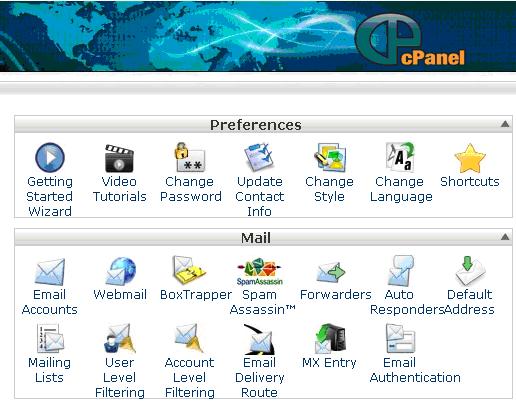
* Figure 3. cPanel site management interface
You may notice from the icons and text that Cpanel offers much flexibility and speed when it comes to website management.
Disk space
Disk space refers to the amount of storage space your web host accords you on their server. The web pages, text, images and databases that you use on your website all require some place to keep them. The web host will aggregate all these and conveniently store them on their servers. The volume of disk space required will depend on the type of site you are running. If you have a simple site, you will need just 1 GB of data storage but a membership or a video site with hundred of thousands of users will need some 10GB or even more.
By necessity, every web host will offer some disk space, but the volume offered must match your website needs. You will particularly need a disk space service that allows you to upgrade to a bigger storage as your website grows. This way, you are assured that your site will be up and running as your membership site or video site grows.
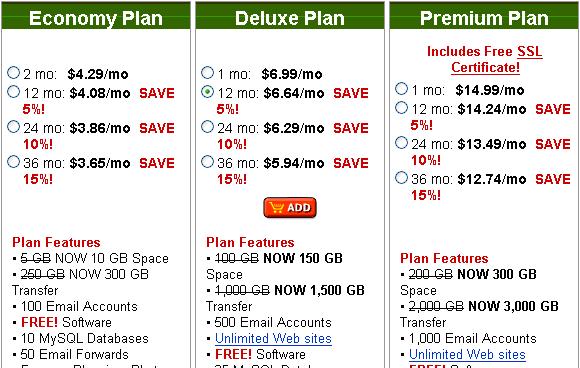
Figure 4. A web host chart shoeing disk space plans
You may observe that the Premium plan offer the largest of disk spaces and invariably costs the most.
In calculating your disk space, you will have to take into account non-web page files, for example, you will need to consider the number of email accounts you will be holding. These are not necessarily web pages but do take up space as well.
You will need a bigger disk space for other reasons too. Your web pages will load faster if you have a bigger space. A large space means your pages will not be crammed on your site. They will be free and immediately available for download. Your site visitors will not have to wait for hours for your pages to appear. So a bigger disk space will help your website grow and become user-friendly as well.
Databases also take up a lot of disk space. If you have offered unlimited inbox capacities to your users or offered them large format personal homepages, then you would need to get extra size disk space.
The issue of disk space is crucial for website owners. You would want to make your website available at all times, you would want your users to experience a fast download of your site and even make their video stream interruptibly. All of these activities require large disk space. Be sure to check with the host you intent to sign up with if they have the amount of space you need. You will do yourself a great deal of good if you choose one with sizable storage so you can run your site smoothly.
Email accounts
Every website needs email. You will need to put up a professional image and a domain based email is one way to do that. You will put up a more credible front if you have an email address based on your website instead if a free one like yahoo.
Again, you will need to have different email address for various segments of your website. If you run an e-commerce website for example, the customer service, sales, tech assistance and webmaster would need their own emails, so that issues related to each department are resolved quickly and conveniently.
Ultimately your web host must provide an elaborate email service so you can be able to administer your website with ease.
Aside from this, you will need to undertake several email operations of which the majority are reviewed here.
Email forwarding is something your webs host must offer. This service will enable you to receive your domain based email at your personal email. For example if your email address is sales@hosting.com, then when customers send you emails, you will get it at jolie@yahoo.com. You will have the added convenience of looking at your corporate emails in your old and frequently used mailbox.
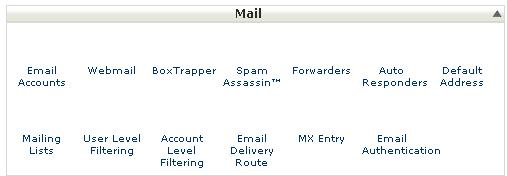
Figure 5. Part of a cPanel console showing email management tools of a web host
An auto responder is another feature you will find useful. It is a system offered by hosts that enables you to send predetermined messages to each mail that arrives in a certain box. You will need this capability f you need to send routine and repetitive messages from a certain email account.
Your web host must limit the amount of spam that gets into your mailbox. They must have scripts to prevent unsolicited mail. A common and free program is Spam Assassin which almost every web hoist provides.
Email services cannot be ignored in your search for a good web host. They enable you to streamline your communications to get yourself organized. Your prospective hosting provider must offer you that as part of their service.
Reliability
You have designed the most elaborate and fantastic site of all times. You have uploaded the files successfully to your web host. You have placed several ads and have got many visitors to your site. You however wake up one morning to find out that just as your site was experiencing a boost in traffic, it goes down. This scenario is something every website owner would want to avoid. You would like to see you site up and running 24 hours a day, without exception.
So reliability is one essential factor you cannot ignore in your choice of web host. A website that is down frequently will lose its visitors. So will one that has a slow download and frequent outages.
You will therefore need to assure yourself that your web host will provide guaranteed access to the site. It must be part of their service offer and you must see their uptime guarantee in their service. You must see the 99% uptime guarantee in their service agreement so you can refer to the written information if they fail to provide the guarantee.
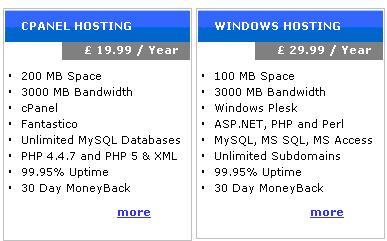
Figure 6. A web host guarantees uptime in it hosting plan
How do you choose a web host that is reliable? Well, you will see the make effort to guarantee it. You will see something like 99% uptime guaranteed on their service offer page or notice of refund if they are unable to guarantee that. Though, these may not be actually enforceable, it tells you of their commitment to provide reliable service to their customers. If the site has previous clients, you may want to find out from them as well. Additionally, you can test how reliable on website is. You can try to access the site fro different locations, through different browsers, at different times of the day and from different PCs. These activities will at least tell you how committed they are to their declarations.
The website must also offer you back up assurances. In the event of disaster, you must be able to recover all your files. Many sites offer these services for free, and you must particularly look for this feature if you are seeking a web host. It is important that they also have an alternate power source so that the site will not go down due to power failure.
Site redundancy is something every website owner would like to avoid at all costs. You must choose a web host that will guarantee round the clock uptime. You will not want to lose customers to your flourishing website due to server outages and slow downloads.
Server type
A Server is a computer that serves web pages to web users. No matter what website type you run, you will need your pages to be stored on web servers. For this reason, you cannot ignore the features of the Server you intend to keep your files on for its capabilities will determine how you can host your web pages.
Servers operate on strict technology. In other words, each Server has its underlying technology which may match or not match your particular website. Fort this reason, it is of the utmost importance that you choose a host which Server will complement or enhance your web pages or overall website.
What sever type do you choose for you website? Well, the answer depends on many things, but for a simplified approach and to make decision making easier, we will group Server into two main types and then match each against known website technologies and features.
The two main types of Servers offered today are Windows and Linux based.
If your files are predominantly of .php extensions, you will need a Linux
Server. If you need to configure your .htacess files, then you need this
Server type as well. A website running mysql database will go for Linux
Servers.
On the other hand, web pages made with Microsoft technology will need
Windows Servers. Pages created with MS FrontPage, files ending with .asp
4extensions or databases running MS SQL technologies will all require
Windows Servers.
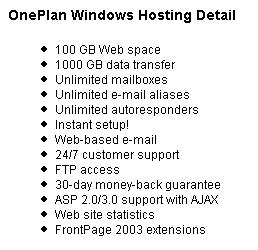
Figure 7. Web hosting plan on the Windows platform
Figure 7 shows a Windows web hosting plan. You may want to note the FrontPage Extensions and asp.net components which are all Windows technologies.
The number of sites sharing a single computer is also important in the selection of your Server type. If you are concerned about security and its utmost performance, you may want to get a dedicated Server which will host your website on one PC. You will be able to run advanced or customized applications on this type of Server. With a shared Server you use the same IP and resources like other websites. This situation can result in blacklisting of your site if any of the other website owners engages in any fraudulent activities as websites are identified by the IPs they belong to.
The kind of Server you choose will depend on many factors. You will need to take a critical look at your website technologies and find the host that will match your needs accordingly.
Site management tools
No website remains the same. After the web designer has finished your website, it will then be your responsibility to do updates. You will need to change the images, remove old text, change the format, install new scripts or even offer downloads. All of these activities require elaborate administration.
If you are a beginner or a non-techie, you will find the website
management tool of your web host an indispensable part of your website site
management. You will use it to go about complex programming tasks on your
site.
A web host that offers site management tool will facilitate the undertaking
of these tasks and make you do more in les time. An ideal website management
tool will enable you to manage passwords and user names, manage files,
manage page redirects and even images.
Figure 8 shows a website management tool that allows users to graphically administer their website pages. Note that you can delete, edit or moves pages from this console.
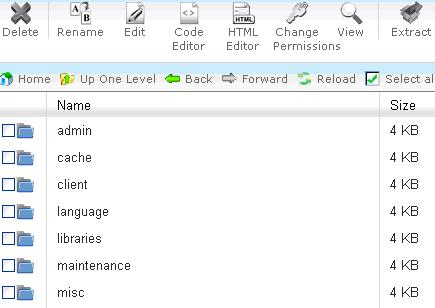
Figure 8. Website management tool
The site management tool that your web host offers must be very flexible to use. You will have to read the features of the tool and come to a conclusion if it is versatile. It must allow you to update your website from any where. It must feature a browser based interface. You should not install any special program on your computer to be able to use it. Again, it must be easy for novices to use. You can test drive the tool at the host's website or read about its characteristic in detail. The site management tool offered by the host must be very fast to load. You would not want to wait forever to manage your site. The panel must be able to load very fast and display the tools in a very friendly way.
You will appreciate the need for a site management tool if you are, for
example, running a site that has about 10,000 pages, and you need to make
universal changes on all the pages. This situation will obviously need a
central console that will quickly let you apply the modifications without
necessarily downloading the entire site and then effecting the changes. You
will not find the alternative of making the changes offline and then loading
the site easier either.
The site management tool is a necessary part of every web host service. If
you are going to choose a web space provider, you must get one that offers
this feature so you can manage your web pages on a breeze. You will need the
tool even if you are a professional as it is a time saving one. You will
find this feature a time saving one and will complement the effectiveness of
your update. You will need this tool if you are going hand over your website
to a non-techie who will have to do frequent updates. You will make his job
easier and ensure that consistent updates are carried out across the site
harmoniously.
Security
If you are running a website that features a shopping cart or stores or processes sensitive information such as credit cards, social security numbers or bank accounts details, you will need to be concerned about security. Given the anonymous nature of the internet, you will need to assure yourself that every information processed at your website is safe and will not be divulged to malevolent users. You will need to assure your customers that your site will not be compromised by cyber criminals and the content fraudulently used.
If you are concerned about security, then you need to select a web host that will protect your web page and its processes. The most common and universally accepted way to render safe web pages over the internet is through the use of Secure Socket Layer (SSL) technology. This advanced security system encrypts sensitive data over the internet so that they cannot be captured by people with ill-intent. If you are browsing a page with this security feature installed, you will notice a closed padlock icon on the task bar of the browser.
![]()
Figure 9. The SSL icon on the lower right of the task bar
SSL is the standard security technology used on the internet. It has become the main means to ensure a secured site. The technology ensures the integrity of all data that passes between the website and the Server. Billions of websites use this technology and it is one sure way to assure customers that their data is safe and secured.
You will also need a web host that can offer you a Digital Certificate of Authenticity. If you have a very sensitive website, you will need a unique SSL not shared SSL. Shared SSL is used by all websites on a Server.
SSL is a way of building confidence in your website. It tells customers that your website is free from hackers and that whatever information they provide will be kept confidential. When customers are assured of this safety, they feel confident to do business with you or visit your website. It also tells them that the website is known and has been verified to be authentic. For this reason, any website providing sensitive services must get a host that provides SSL.
Technical support
A website is hosted in anticipation that it will run smoothly and never encounter any problem but this supposition hardly materializes. On one or two occasions, we may need to contact our web hosts about a problem on our site. We may want to alert the techies of a problem they may not have noticed. At other times, we may want a service that is not listed at their website or we would want to find out about a feature. All of these activities require contact with the hosting service provider.
Technical support or simply put, how well organizations address the problems and concerns of their clients, is therefore crucial for every website owner. You must therefore choose a company that will offer excellent customer service and address your needs quickly.
Choose a web host that offers 24/7 support. Stay away from hosts that offer only week day support for you can encounter problems or need help over the weekends as well.
Your web host must offer their clients several methods of support. They should provide phone lines, online chat, knowledgebase, emails and bulletin boards. A company may not necessarily offer all of these methods of communication but the fact remains that the more contact mean the site offers, the more responsive they can be to their clients.
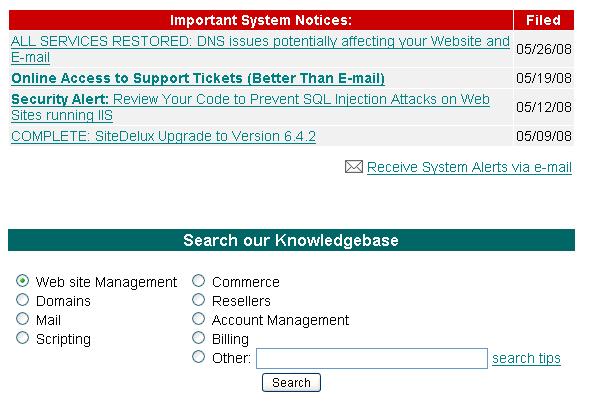
Figure 10. A web host provides alternate means of contact and support
You will need to ascertain any claim that the site makes concerning the efficiency of their support services. Send them emails and see how long they take to respond. Try to make a call and determine for yourself if the agent is cooperative, understanding and patient. You will also have to find out about the competence of the support staff. Many a time web hosts just employ people who are more sales inclined than technical. You need people to help you solve your problems.
Lastly, find out what others are saying about their service. You can visit sites that review web hosts and see what others have written about then. You can also visit forums and then read about user posts. Be careful about these types of verifications. A review site can sabotage a hosting provider with a poor rating or a staff or affiliate can deceive website owners into signing up with an affiliated company with claims that are untrue.
Conclusion
Choosing a webs host requires that you take an appraisal of your website, the technology used to create it, your web page elements and your future growth. You will also have to make room for emerging technologies and web trends. All of these scenarios require that you choose a web hosting provider with utmost care.
You will have to first compile a list of all hosts that meet your need and then sift them down to the one that best meets your need at the least price. In determining your ultimate choice, you are considering several factors, such as customer response time, reputation, server uptime guarantee, security and reliability. You are going to choose a host that will give you value for money and at the same time make you retain your hard won customers.
You are going to look beyond the rhetoric of the web hosts. You are looking beyond their marketing gimmicks and rather applying all circumspection to make a wise choice. As part of your due process, you will want to visit forums which review web hosts and read about comments or complaints previous customer have about your prospective host.
You do not expect your website to run into trouble, but from time to time you may need the support of your host. Are they readily available? Does it take weeks to receive feedback from them? Which host will immediately resolve your issues? What tools do they have to address your complaints? Does the service provider offer its clients a web based chat where clients can quickly access technical support? Are they reachable by phone? You will have to consider all these features in your selection of a web host.
Be careful about sites that offer extremely low charges. Many times they are resellers or web hosts providing the service from their garages. They may not be able to guarantee the essential uptime and back up services you need for your site.
Again, read through the web host policy to take note of any obligations and responsibilities. You will want to avoid any site that has policies you do not agree to or that will be inimical to your website.
At the minimum a web host must provide you with a server space of 10mb, Cgi-Bin, a server uptime of 99%, three email accounts, FTP access, web based email, a user friendly control panel, free scripts and an interface to let you now your website statistics.
| |
| Site Search |

